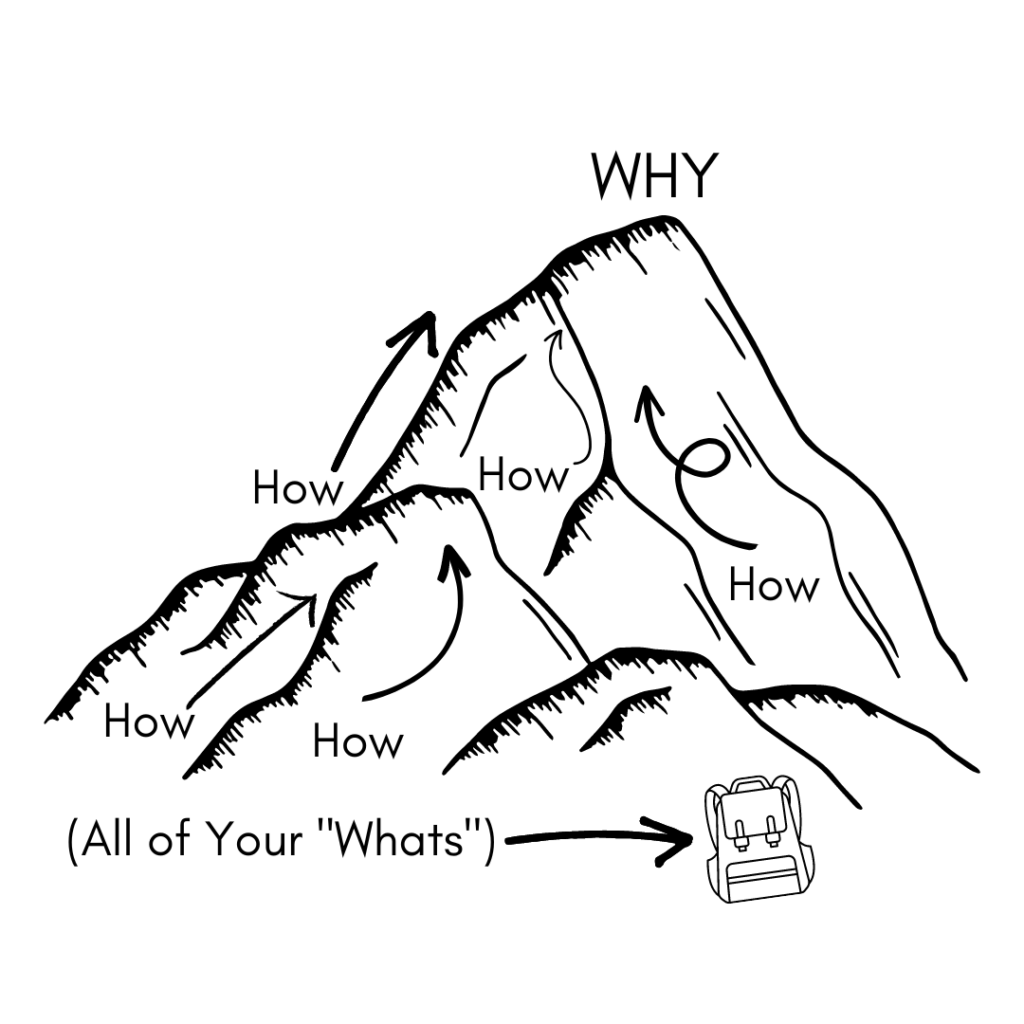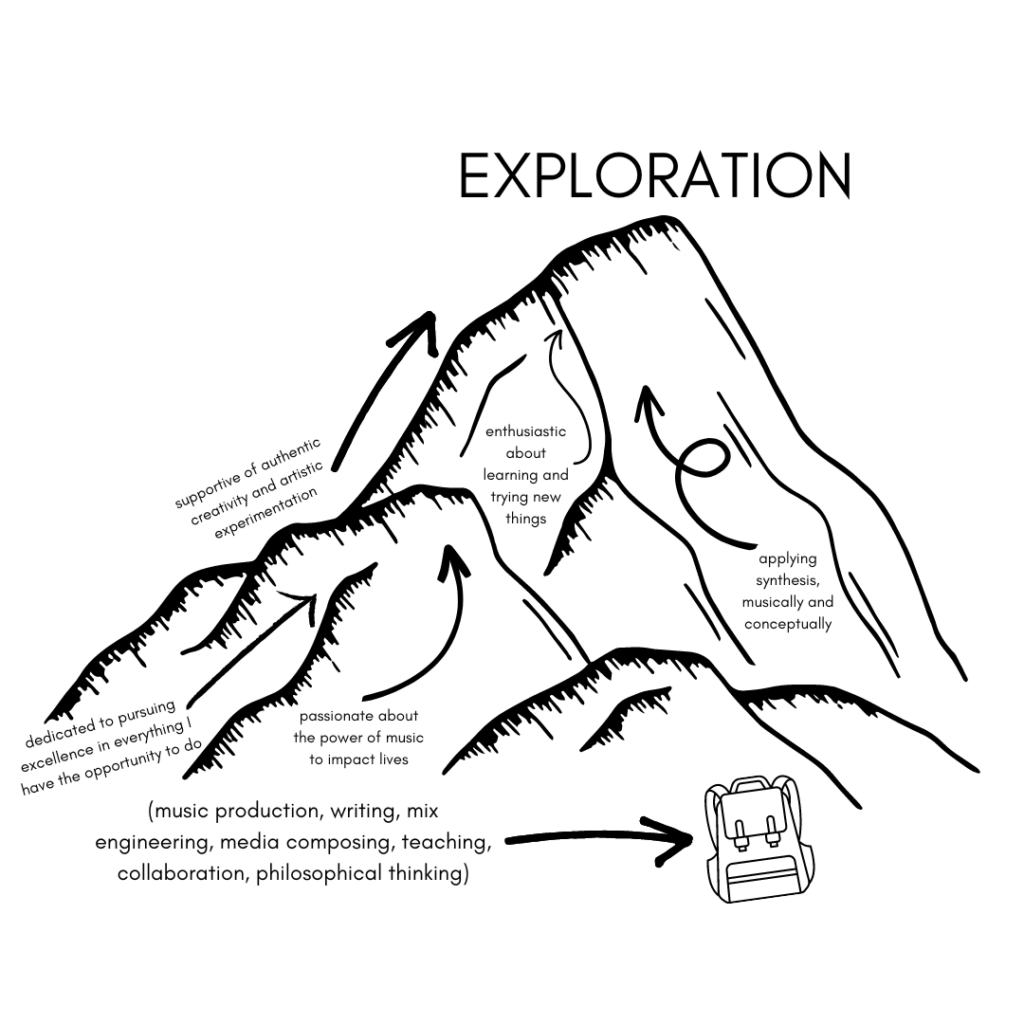Why can’t I find just one thing to focus on? Why can’t I be satisfied with one career? Why do I change my mind so often? Why didn’t I stick with X, while Y became my priority?
Ironically, these questions all begin with that element we’re actually seeking: Why.
One of the challenges that multipotentialites often face is trying to make sense of our diverse interests and pursuits. This issue runs deeper than the ever-present difficulty of finding the language to explain what, exactly, we do or describe ourselves to other people. Even more important than how we represent ourselves to the outside world, struggling to identify what guides us in our pursuits can impact how we view ourselves as individuals and how we assess our own lives.
Without an overarching motivation, passion, ideal, or whatever you would call this elusive entity, it’s easy to feel like we lack a sense of direction or clear purpose in our lives. Even when you think you’ve fully embraced your true multipotentialite self, that nagging feeling of doubt and uncertainty can seemingly strike at any time.
Part of being a multipotentialite and embracing our multipotentiality often involves coming to terms with the fact that we don’t have that “one true calling,” as Emilie originally discussed in the TED talk that brought many of us here! But even as we come to understand ourselves better and appreciate our multipotentiality, we might still yearn for something to tie all of it together—that single overarching, unifying element that connects our seemingly disparate and unrelated pursuits.
I was recently tasked with finding my own “Why” as part of a class assignment, and my process led me to think deeply about the power of having a clear, identifiable Why to lean on, especially across a multifaceted multipotentialite life. But I also realized that, even if we don’t identify the golden thread that ties our many “whats” and “ands” together, that thread still seems to be present, holding it all together. In other words, the overarching Why and the principles and values that guide us are still present in our lives, even when we struggle to identify exactly what they are.
What do we actually mean by a Why?
The idea of a personal Why can seem a little bit vague, philosophical, or intangible at first. Essentially, a personal Why encapsulates what drives you to do what you do, and guides how you do it.
When seriously considering it within the context of my own life, I was pretty skeptical (as you might be) about how it would apply to me and my multipotentialite values. It seems completely valid to me to think that multipotentialites can have more than one Why guiding their lives, and finding several guiding principles or themes that function in relationship with each other can be just as powerful as identifying one overarching Why.
Your mountain of What, How & Why
Simon Sinek emphasized the importance of a central Why for leadership and marketing in his impactful 2010 TED talk, framing the Why as the middle of a bullseye, dubbed the “golden circle.” In this structure, “What” we do is on the outside of the bullseye, followed by “How” we actually do it, with the powerful “Why”at the core.
To slightly reframe Sinek’s structure with our multipotentialite lifestyles in mind, I conceptualize the relationship between What, How, and Why as a mountain, with multiple paths to the top:

The pinnacle of the mountain is our (potentially elusive) singular Why, while the routes we can take in pursuing it represent How we approach what we do. Since multipotentialites may tend to get a bit caught up in trying to make sense of What we do—and our Whats can be so prolific—I found that it helped me to actually set what I do aside and focus on How I approach my passions, roles, and responsibilities. In this metaphor, I would say that What we do is just what we take with us on our journey toward our pinnacle of Why.
Searching for your Why can provide a sense of direction
An important element of this metaphor involves the goal of the journey, regardless of which route(s) we choose to take. There also might be multiple Whys at the top of your own mountain, and you may or may not be able to find the single, overarching Why that joins them. Whether or not you can identify your Why and express it in clear language, the goal of fulfilling it still guides how you approach your life and propels you forward on your path.
The power of vagueness
Part of what helped me through the exercise of figuring out how to express my Why involved letting go of the idea that it needed to be specific and somehow reflect all of my Hows and Whats. It might be more feasible for specialists to identify a narrower Why that directly relates to what they do and how they do it. But for multipotentialites, approaching the idea of a personal Why in this way makes the task of seeking it out feel frustrating and stifling, rather than meaningful and empowering.
As Sinek says in his TED talk, “what you do simply proves what you believe.” With this idea in mind, we can view the single Why that we’re seeking out as the core of what we believe. What beliefs about yourself and your relationship to the world inform everything you do? Whether your list is long or short, your Why might begin to emerge from these beliefs and their impact on your Hows.
After conceptualizing Sinek’s “golden circle” a bit differently in this way, I was able to arrive at my own overarching Why—and I actually felt good about it. (I suspect my Why might be one that many other multipotentialites share in some ways, with our more particular, multiple Whys stemming from a version of this overarching guide.)

While I did ultimately reach an overarching, broad Why that feels meaningful to me, I took away other powerful insights from this exercise as well. As a multipotentialite, I have found that a significant part of my identity involves balancing my diverse interests, skills, and career roles, and figuring out how to represent these complexities to the outside world. The process of seeking out my Why reminded me that the guiding impulse behind what we do is more important than where it leads us to go.
In other words, what we bring to the table as multipotentialites is valuable. But it’s not as valuable as how we approach the table or why we’re there.
Your turn
Do you think that we all have a single, guiding Why in our lives, whether or not we can articulate it? Has seeking out or identifying your own Why or Whys provided you with insights about your own life?

Need help finding an overarching theme for your business? Check out Emilie Wapnick’s popular guide, Renaissance Business.

This article was extremely helpful. Thank you!
I’m struggling to find my Why but this may help me a lot in how to approach it.
Hi Kimberly! I’m so glad this was helpful; seeking out our why or whys is definitely a journey that can take some time and self-curiosity 🙂
I have found this article extremely useful and the Exploration as your Why has made me think of the Explorer archetype which is typically a multipotentionalite archetype as we tend to explore different careers and paths in our lives and our main goal is to explore. Personally speaking my main goal at this stage of my life is also gathering knowledge, as in the Sage archetype.
Hi Katiuscia! I’m glad this was helpful – I definitely relate to the explorer archetype and I can see that being common among multipotentialites. I think the sage can evolve naturally out of being an explorer as we gain knowledge in different areas!
I’m an Explorer-Sage, too!
One of the aspects of being a multipotentialite that has been such a gift to me, is that it allows exactly this sort of cross-referencing on one’s own values. By becoming immersed in such a wide range of activities and knowledges, it becomes easier to see those elements which remain shared despite the differences. Like placing filters over an image you can see which parts stand out from the rest. It has fueled my confidence and excitement about keeping a broad range of things in motion, because seeing more allows me to continue refining the core themes. Knowing some of my core values is its own superpower. It is easier to spot things which I have no interest in earlier on, and it has given me some clear lines that I no longer try and cross. This saves me mental energy and helps me chart a path that aligns more closely with what makes me happy, even while I continue pursuing something new and untested.